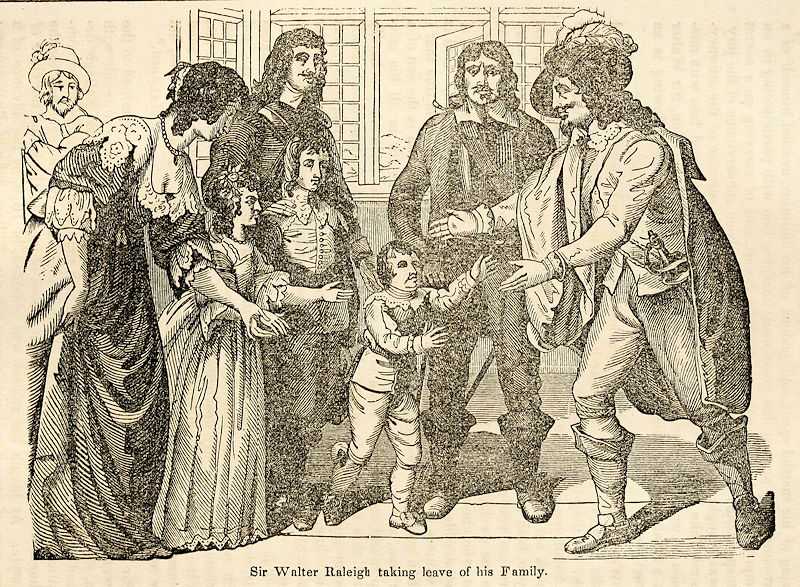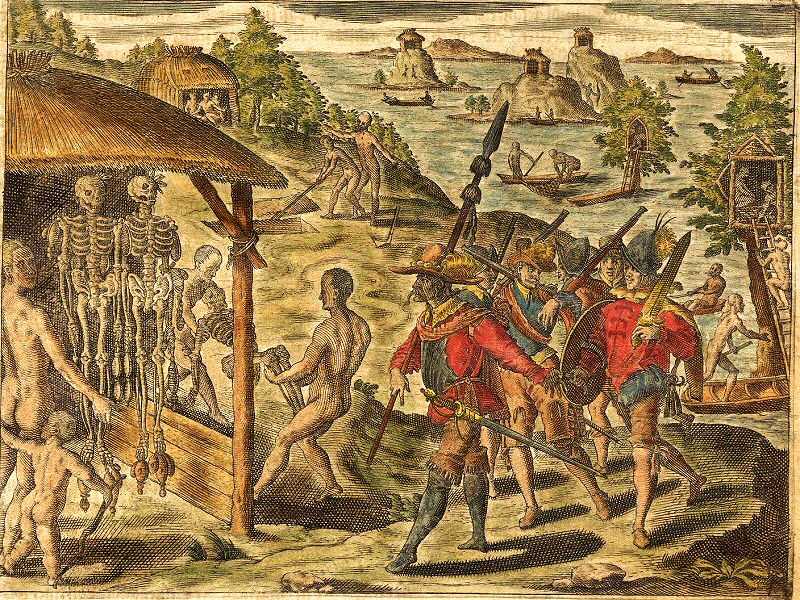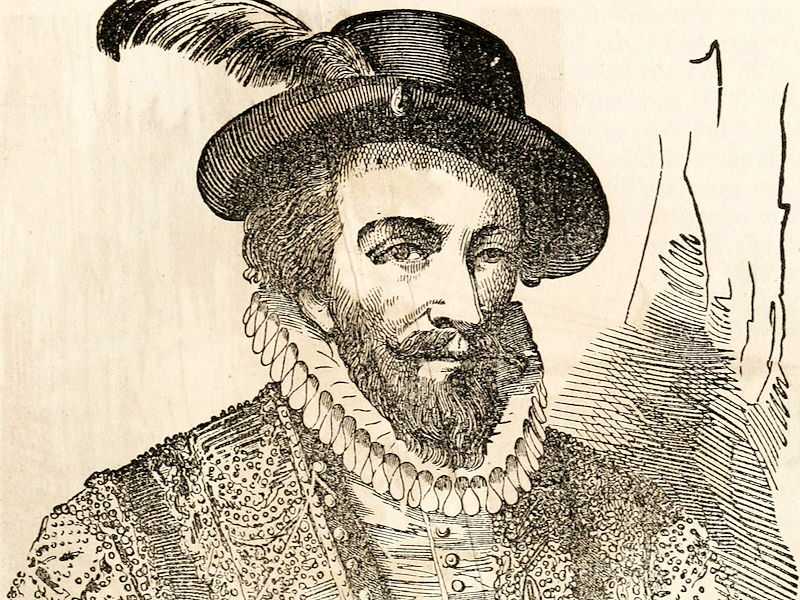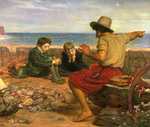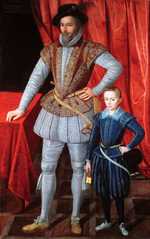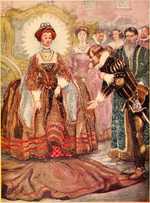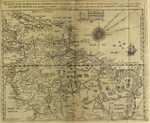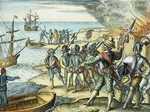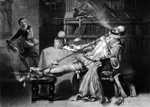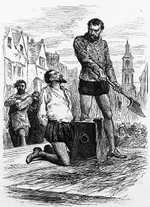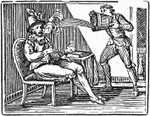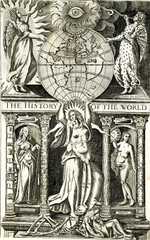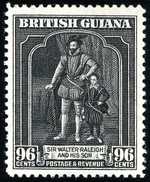1. Raleigh's early life
Sir Walter Raleigh (also spelled Ralegh) was born into a well-connected gentry family at Hayes Barton in Devon in around 1552.
He grew up in a family of devout Protestants, who were persecuted during the brief reign of Catholic Mary I (1553-8). From an early age Walter developed a dislike of Catholicism. Raleigh was the youngest of five sons of Catherine Champernowne and Walter Raleigh, both in their second marriages.
Raleigh's siblings
Raleigh's half-brothers John Gilbert, Humphrey Gilbert, and Adrian Gilbert, and his brother Carew Raleigh were also prominent during the reigns of Queen Elizabeth I and King James I. His half-brother Humphrey Gilbert was a prominent explorer and Member of Parliament, as was his brother Carew Raleigh.
At the age of 17, Raleigh left England for France to fight with the Huguenots (French Protestants) in the Wars of Religion. In 1572, he attended Oriel College, Oxford, and studied law at the Middle Temple law college. During this time, he began his lifelong interest in writing poetry.
2. His early career
Sir Walter Raleigh fought in the service of Queen Elizabeth I in Ireland between 1579 and 1582, fighting against the Irish rebels in Munster.
His outspoken criticism of the way English policy was being implemented in Ireland brought him to the attention of Queen Elizabeth, and he was invited to court in 1582. Charming the Queen with his valour and chivalry, Raleigh quickly became a firm favourite of the Queen’s.
Raleigh's relationship with the queen
The dynamics between Queen Elizabeth and Sir Walter Raleigh have been well documented, and legend has it that Raleigh once threw his cloak across a puddle so that the Queen could walk across without getting her feet wet.
The Queen rewarded Raleigh with monopolies, trade privileges, and large estates in Ireland. In 1584 he became a Member of Parliament. The following year he was knighted and appointed warden of the tin mines of Cornwall and Devon. And in 1587, he was appointed captain of the Queen's Guard.
3. Raleigh's expeditions
Sir Walter Raleigh was an early supporter of colonising North America.
Between 1585 and 1588, Raleigh invested in a number of expeditions across the Atlantic, attempting to establish a colony near Roanoke, on the coast of what is now North Carolin, and name it “Virginia” in honour of the virgin queen, Elizabeth.
Importing potatoes and tobacco to England
The colony however failed and the colonists returned to England bringing with them potatoes and tobacco, two things unknown in Europe at the time. Potatoes were first grown on Raleigh’s estates in Ireland, and he has been credited with bringing potatoes and tobacco to Britain. He also popularised smoking at court.
A second voyage was sent in 1590, only to find no trace of the colony. The settlement is now remembered as the "Lost Colony of Roanoke Island."
Thrown into the tower of London
Raleigh’s winning streak with the queen, however, took a nosedive in 1592 when it was discovered that he’d secretly married his lover, Elizabeth ‘Bess’ Throckmorton, a lady-in-waiting to Queen Elizabeth I. Bess was already pregnant, which explained both the marriage and the secrecy. Enraged by their plotting behind her back, Elizabeth dismissed Bess and imprisoned both of them in the Tower of London. Walter was himself released after a few months, but banished from court for five years.
Upon his release, Raleigh hoped to find favour with the queen again. During the time he was banned from the Queen’s Court, Raleigh led a few expeditions one of which was to Guiana (now Venezuela) in 1594 to search for El Dorado - the legendary land of gold.
Another expedition
He sailed up the Orinoco, made friends with the natives, and gathered stories about fabulous gold mines, however the expedition team, which included his brother Sir John Gilbert, failed to find the mysterious, El Dorado. Raleigh was able to discover some gold mines in South America, and did return to England with some gold. During the expedition, Raleigh also a celebrated writer, wrote The Discoverie of the Large, Rich and Beautiful Empyre of Guiana to promote colonialism.
It was the success of Raleigh’s subsequent explorations to Cadiz and the Azores, against the Spaniards that reinstated him with the queen. He returned to the Queen’s Court in 1597, but his influence or power was not what it had once been.
Sentenced for treason
In 1603, James VI of Scotland succeeded Elizabeth I as James I of England. Raleigh’s dislike of Catholics and opposition to Spanish expansionism in South America were at odds with the King, who was keen to improve relations with Spain. The King disliked Raleigh, and that same year, Raleigh was accused of plotting against the King and sentenced to death.
This was reduced to life imprisonment and Raleigh spent the next 12 years in the Tower of London, where he wrote several poems and the first volume of his 'The Historie of the World'. In spite of being held a prisoner at the Tower of London, Raleigh lived a comfortable lifestyle there with his family - his devoted wife Bess and their two sons, Walter and Carew. He also grew exotic plants there and practiced herbology, making herbal remedies from plants and other ingredients discovered on his expeditions.
Raleigh was released to lead a second expedition to search for El Dorado in 1616. The expedition was a failure, and Raleigh also defied the king's instructions by attacking the Spanish. On his return to England, the original death sentence for treason was reinstated and on 29 October 1618, Raleigh was executed.
Shortly before he was executed, Raleigh said to a hesitant executioner:
“This is sharp medicine; but it is a sure cure for all diseases. What dost thou fear? Strike, man, strike.”
4. Raleigh's legacy
Sir Walter Raleigh remains one of the most notable British explorers of all time - best remembered as the man who introduced the potato and tobacco to England.
A celebrated writer and poet, Raleigh left a legacy of poems and books he had written during his imprisonment. With access to 500 books in the Tower of London’s library, he started working on his book The Historie of the World in 1614, the first five completed volumes of which were published that same year.
Revealing Raleigh’s cynicism about monarchy, James I and the Archbishop of Canterbury, George Abbot, demanded copies to be seized and publication banned. Despite their efforts, the book became very popular and was reprinted many times during the 17th century.
Interesting fact ...
The state capital of North Carolina, its second-largest city, was named Raleigh in 1792, after the explorer sponsor of the Roanoke Colony. In the city, a bronze statue, which has been moved around different locations within the city, was cast in honour of the city's namesake.
His interests & knowledge
Raleigh also grew exotic plants from seeds he had gathered on his travels, which he grew in The Tower of London while imprisoned. He used the plants to create herbal medicines, which included his Balsam of Guiana, a potent medicinal cordial of strawberry water, and his ‘Great Cordial’ a mixture of 40 ingredients, including herbs, spices and powders of pearl, deer’s horn and ambergris (a secretion from a sperm whale’s intestines). With an interest in both herbology and alchemy, Raleigh shared this knowledge in The Historie of the World.
Raleigh’s relationships with Queen Elizabeth I and her lady-in-waiting and his true love, Elizabeth ‘Bess’ Throckmorton have intrigued historians for centuries, and has been the subject of the 1955 movie The Virgin Queen and the 2007 film, The Golden Age, starring Cate Blanchett as Queen Elizabeth I and Clive Owen as Raleigh.
